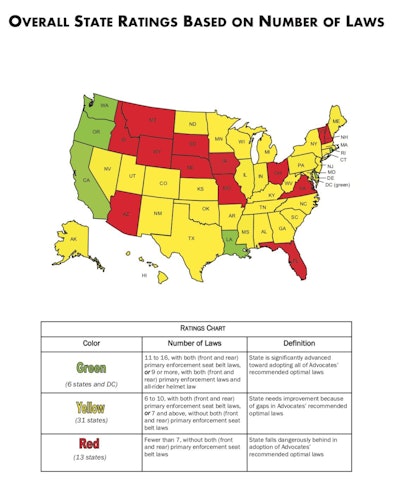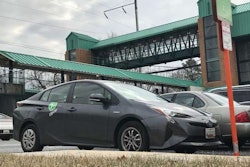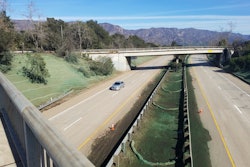 State-by-state ratings in 2018 Roadmap of State Highway Safety Laws report. For the full report and to access the news conference webcast, go to SafeRoads.org (PRNewsfoto/Advocates for Highway and Auto)
State-by-state ratings in 2018 Roadmap of State Highway Safety Laws report. For the full report and to access the news conference webcast, go to SafeRoads.org (PRNewsfoto/Advocates for Highway and Auto)Six states and the District of Columbia earned good ratings and 13 states received poor ratings in a recent report gauging the number of traffic safety laws a state has enacted. The rest were deemed yellow, for caution.
The 2018 Roadmap of State Highway Safety Laws rates all the states and the District of Columbia on the adoption of 16 traffic laws deemed key by the nonprofit Advocates for Highway and Auto Safety.
The laws include primary enforcement of both front and rear seat belts, all-rider motorcycle helmet requirements and graduated licenses for teen drivers.
Those receiving a green, or good, rating are Rhode Island, Delaware, Oregon, Washington, Louisiana, the District of Columbia, and moving up from yellow, or caution, last year, California.
States with a red, or poor, rating are South Dakota, Wyoming, Arizona, Missouri, Montana, Florida, Nebraska, Virginia, Idaho, Iowa, New Hampshire, Ohio and Vermont. Moving off the 2017 list into yellow are Mississippi, Nevada, North Dakota and Pennsylvania.
“Our country is approaching nine years without a single death caused by a commercial aviation crash. Yet, today, we can’t go 15 minutes without a motor vehicle crash fatality,” said Jackie Gillan, president emeritus of Advocates. “The most promising and pragmatic strategy is adopting safety laws and advancing safety technologies, as highlighted in the Roadmap Report.”
Other laws advocated in the report include:
- Requiring children under 2 to face the rear of the vehicle in child protection seats.
- Booster seat requirements for children.
- Impaired-driving laws requiring all-offender ignition interlocks and addressing child endangerment and open containers.
- All-driver text messaging restrictions.
- Restricting mobile phone use for teen drivers.
The report also calls on lawmakers to require advanced technology in vehicles to prevent crashes. These include collision-avoidance systems, automated speed and red-light enforcement, as well as the means to improve large-truck and rear-seat safety.











